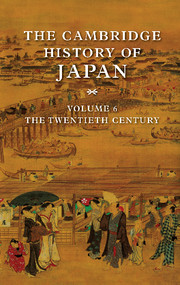6 - Continental expansion, 1905–1941
from PART II - EXTERNAL RELATIONS
Published online by Cambridge University Press: 28 March 2008
Summary
GREATER JAPAN OR LESSER JAPAN?
The world's attention turned toward Japan after its victory in the Russo-Japanese War. This small island nation in East Asia not only had escaped falling under the colonial control of the Western imperialist powers, but it also had emerged as an imperialistic nation in its own right, on its way toward hegemony in East Asia and the western Pacific. The advanced countries that opposed or supported Japan in the war against Russia, and other Asian countries that were the targets of Western expansion, contemplated Japan's future with a mixture of admiration and wariness.
In retrospect, it can be said that the Russo-Japanese War brought Japan to an important crossroads in the path of its national destiny. The basic issue was whether Japan should be satisfied with a limited success as a solid middle-sized nation or should drive toward becoming a great military power dominating the Asian continent. In the postwar years, journalists and intellectuals debated Japan's goals and direction during its next stage of development. The debate considered several issues: greater “Japanism” versus little “Japanism,” northern advance versus southern advance, and army-first versus navy-first. Greater Japanism implied continued expansionism, whereas little Japanism implied satisfaction with the postbellum status quo. Northern advance and southern advance were somewhat more ambiguous terms. The first was generally understood to mean a policy of continental expansion from the Korean peninsula through Manchuria into China proper; the second was understood to mean expansion from Taiwan into south China and Southeast Asia.
- Type
- Chapter
- Information
- The Cambridge History of Japan , pp. 271 - 314Publisher: Cambridge University PressPrint publication year: 1989
References
- 5
- Cited by

